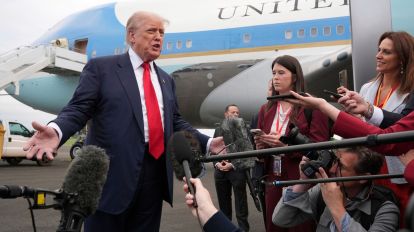Trump Lands in Scotland, Demands Immigration Action from Europe

U.S. President Donald Trump has intensified pressure on the European Union, telling European leaders to address immigration issues before engaging in trade negotiations with the United States. Arriving in Scotland on Friday, July 25, 2025, Trump combined business with official meetings, making strong statements about European immigration policies, branding them as a "horrible invasion" that is "killing Europe."
Von der Leyen to Meet Trump Amidst Trade Deal Uncertainty

European Commission President Ursula von der Leyen is scheduled to meet with President Trump in Scotland on Sunday, July 27, 2025, to discuss a potential US-EU trade deal. Trump has expressed uncertainty about the prospects of an agreement, stating a "50-50 chance, maybe less" of reaching a deal with the EU, despite previous indications that a deal was nearing completion. The meeting comes amid growing concerns over trade relations and potential tariffs.
Trump's Tariff Threat Looms Over US-EU Trade Negotiations

The upcoming meeting between Trump and von der Leyen takes place against a backdrop of escalating trade tensions. Earlier this month, on July 1, 2025, Trump announced a 30% tariff on all imports from the EU, set to take effect on August 1, 2025, unless a trade deal is reached. This announcement has put immense pressure on European negotiators to find common ground with the U.S. administration.
Key Dates in the US-EU Trade Dispute

Several key dates are looming that could significantly impact the trade relationship between the U.S. and the EU:
- August 1, 2025: Deadline for the imposition of new U.S. tariffs on EU imports if a trade deal is not reached.
- August 7, 2025: Date by which the EU's approved retaliatory package of $109 billion in tariffs on U.S. goods would come into effect if no deal is reached.
EU Prepares Retaliatory Measures

The European Union has prepared a significant response should the U.S. impose tariffs. The EU has approved countermeasures worth $109 billion (93 billion euros) on U.S. goods. These countermeasures target a range of products, including Boeing aircraft, U.S.-made cars, and bourbon whiskey, and are slated to be implemented if negotiations fail.
Details of Trump's Trade Demands

While specific details of the trade negotiations remain confidential, reports indicate that discussions are centered around a potential compromise involving a 15% baseline tariff on European goods, with possible carve-outs for certain key sectors. This proposed tariff is lower than the initial 30% tariff threatened by President Trump, suggesting potential for negotiation.
Context: Immigration and Trade Under Trump's "America First" Policy
President Trump's stance on European immigration is intertwined with his "America First" trade policy. He has consistently advocated for stricter immigration policies and trade deals aimed at reducing trade deficits and bolstering domestic manufacturing. Tariffs are viewed as a key tool in his negotiating strategy.
Controversy Surrounds Trump's Comments on Immigration and Wind Energy

Trump's strong rhetoric regarding European immigration, describing it as a "horrible invasion," has sparked considerable controversy. His remarks are perceived by many as an intrusion into the internal affairs of sovereign nations. Additionally, his criticism of wind energy has drawn criticism from environmental groups and advocates for renewable energy.
Public Protests Erupt in Scotland

Public reaction to President Trump's visit to Scotland has been marked by widespread protests. Demonstrations have taken place in several Scottish cities, indicating significant public opposition to his presence and policies.
Potential Consequences of a Trade War

Failure to reach a trade agreement between the U.S. and the EU could have severe repercussions for both economies:
- Trade War: A full-blown transatlantic trade war could erupt, with substantial tariffs imposed by both sides, potentially harming businesses and consumers in both the U.S. and Europe.
- Economic Impact: Tariffs would likely increase the cost of imported goods, potentially leading to higher prices for consumers and impacting industries reliant on cross-border trade.
- Diplomatic Strain: Trump's direct and often critical comments on European policies, particularly on immigration, could further strain diplomatic relations between the U.S. and its European allies.
- Political Repercussions: The outcome of the trade talks and the impact of tariffs could have political consequences for leaders on both sides.
Trump Highlights U.S. Immigration Policies

During his arrival in Scotland, Trump referenced his administration's immigration policies, claiming that "last month, we (the United States) had nobody entering our country. Nobody. Shut it down." This statement underscores his hardline stance on immigration and its relevance to trade negotiations.